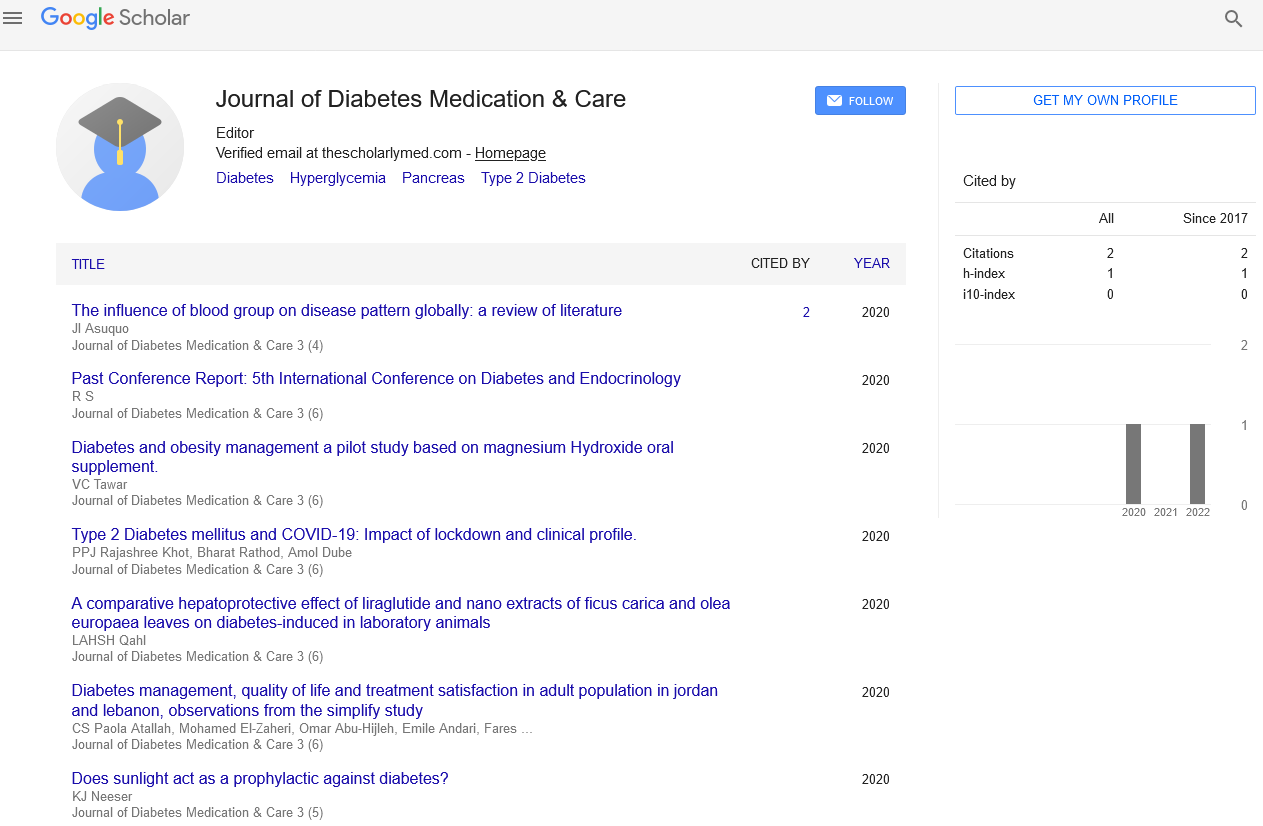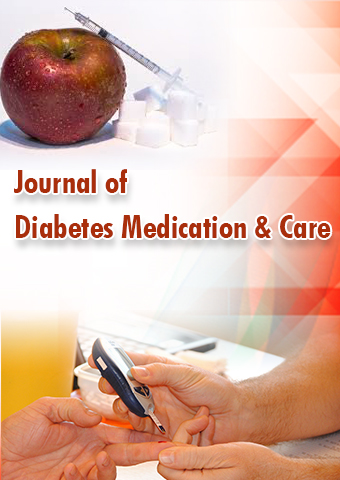Opinion Article - Journal of Diabetes Medication & Care (2023) Volume 6, Issue 5
Mastering Diabetes: A Comprehensive Guide to Insulin Management
- Corresponding Author:
- Reetta Arima
Department of Endocrinology, Stellenbosch University, Stellenbosch, South Africa
E-mail: reatta.aroma@gmail.com
Received: 05-Sep-2023, Manuscript No. JDMC-23-119068; Editor assigned: 08-Sep-2023, PreQC No. JDMC-23-119068 (PQ); Reviewed: 22-Sep-2023, QC No. JDMC-23-119068; Revised: 02-Oct-2023, Manuscript No. JDMC-23-119068 (R); Published: 11-Oct-2023, DOI: 10.37532/JDMC.2023.6(5).121-122
Introduction
Diabetes is a prevalent and chronic condition that affects millions of people worldwide. It is a metabolic disorder characterized by elevated blood sugar levels due to either insufficient insulin production or the body’s inability to effectively utilize insulin. Insulin, a hormone produced by the pancreas, plays a crucial role in regulating blood sugar levels. For individuals with diabetes, proper insulin management is paramount to controlling the condition, preventing complications, and enjoying a fulfilling life. In this article, we will delve into the world of diabetes management with insulin, offering insights, tips, and guidance on how to master diabetes and live a healthy life.
Description
Understanding diabetes and the role of insulin
Before delving into insulin management, it’s essential to understand the different types of diabetes and the role of insulin in the body.
Types of diabetes
There are primarily two types of diabetes
• Type 1 diabetes: This is an autoimmune condition in which the immune system mistakenly
attacks and destroys the insulin-producing beta cells in the pancreas. As a result, individuals
with type 1 diabetes must rely on external insulin administration for life.
• Type 2 diabetes: Type 2 diabetes is characterized by insulin resistance, where the body’s
cells do not respond effectively to insulin. In the early stages, the pancreas compensates by
producing more insulin, but over time, it may fail to maintain blood sugar control. While
diet and lifestyle modifications are critical for type 2 diabetes management, many people
with this type may eventually require insulin therapy.
Insulin therapy for diabetes management
Insulin therapy is a cornerstone of diabetes management, especially for individuals with type 1 diabetes and some with type 2 diabetes. The primary goal of insulin therapy is to maintain blood sugar levels within a target range, which is essential for preventing acute complications (e.g., hypoglycemia) and long-term complications (e.g., heart disease, neuropathy, and retinopathy).
Types of insulin
There are several types of insulin, each with its own unique properties:
• Rapid acting insulin: This type of insulin starts working within 15 minutes of injection and
reaches its peak effect in about 1 hour. It is typically taken just before or immediately after
meals to control post-meal blood sugar spikes.
• Short acting insulin: Short-acting insulin takes about 30 minutes to start working and
reaches its peak in 2-3 hours. It is typically taken 30 minutes before a meal.
• Intermediate acting insulin: Intermediate-acting
insulin has a slower onset, starting
within 1-2 hours and peaking at around
4-12 hours. It is often used to cover blood
sugar control between meals and overnight.
• Long acting insulin: Long-acting insulin
has a steady, slow release over an extended
period, usually 12-24 hours. It provides a
baseline level of insulin to help control blood
sugar levels between meals and overnight.
• Ultra-long acting insulin: This type of
insulin has an even longer duration of
action, often lasting more than 24 hours,
providing a stable basal level of insulin.
Personalized insulin regimens
Insulin therapy is highly individualized. The type and regimen of insulin will depend on various factors, including the type of diabetes, lifestyle, and individual insulin sensitivity. Healthcare providers work closely with patients to determine the best insulin plan for their needs.
Insulin management tips for people with diabetes
Successfully managing diabetes with insulin requires a holistic approach that goes beyond medication. Here are some essential tips for effective insulin management:
Education is key
Understanding how insulin works, the types of insulin available, and proper injection techniques is crucial. Patients should work closely with healthcare providers, diabetes educators, or endocrinologists to build their knowledge base.
Monitor blood sugar
Regular blood sugar monitoring is vital. It helps individuals track their progress, adjust insulin doses as needed, and identify patterns in their blood sugar levels.
Maintain a healthy diet
A balanced diet that manages carbohydrate intake can help stabilize blood sugar levels and reduce the need for excessive insulin. Consultation with a registered dietitian can be beneficial for meal planning.
Stay active
Physical activity can improve insulin sensitivity, making insulin work more effectively. Incorporating regular exercise into your routine can help manage blood sugar levels.
Regular medication review
Keep track of your insulin doses and medication changes, and consult with your healthcare provider regularly to ensure your treatment plan is up-to-date and effective.
Prevent hypoglycemia
Hypoglycemia (low blood sugar) can be a significant concern for those on insulin. Always have a source of fast-acting carbohydrates on hand and educate close contacts on how to assist in case of a severe hypoglycemic event.
Avoid missed doses
Consistency in insulin administration is essential. Missed doses can lead to blood sugar fluctuations. Set reminders or alarms if needed to ensure you stay on track.
Engage in supportive communities
Living with diabetes can be challenging, but connecting with others who share similar experiences can provide emotional support and practical advice. Support groups and online communities can be valuable resources.
Manage stress
Stress can impact blood sugar levels. Incorporate stress-reduction techniques, such as mindfulness, meditation, or yoga, into your daily routine.
Conclusion
Diabetes management with insulin is a lifelong journey that requires dedication, education, and a holistic approach to well-being. While it presents its share of challenges, it is possible to live a fulfilling life with diabetes through proper insulin management. Remember that you are not alone on this path. Seek support from healthcare providers, diabetes educators, and fellow individuals living with diabetes. With the right knowledge, a balanced approach to medication, diet, and lifestyle, and a positive mindset, you can master diabetes and enjoy a healthy, fulfilling life.

